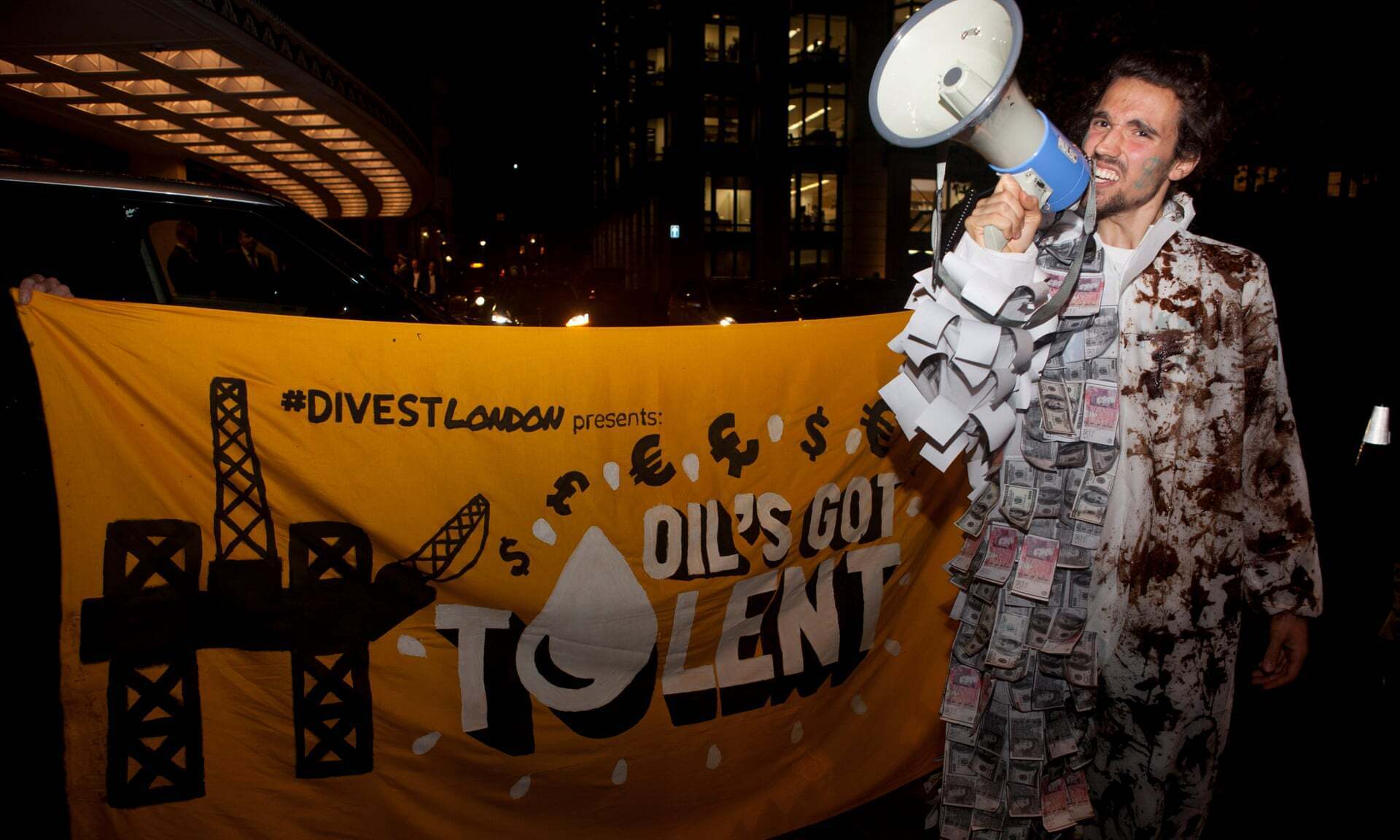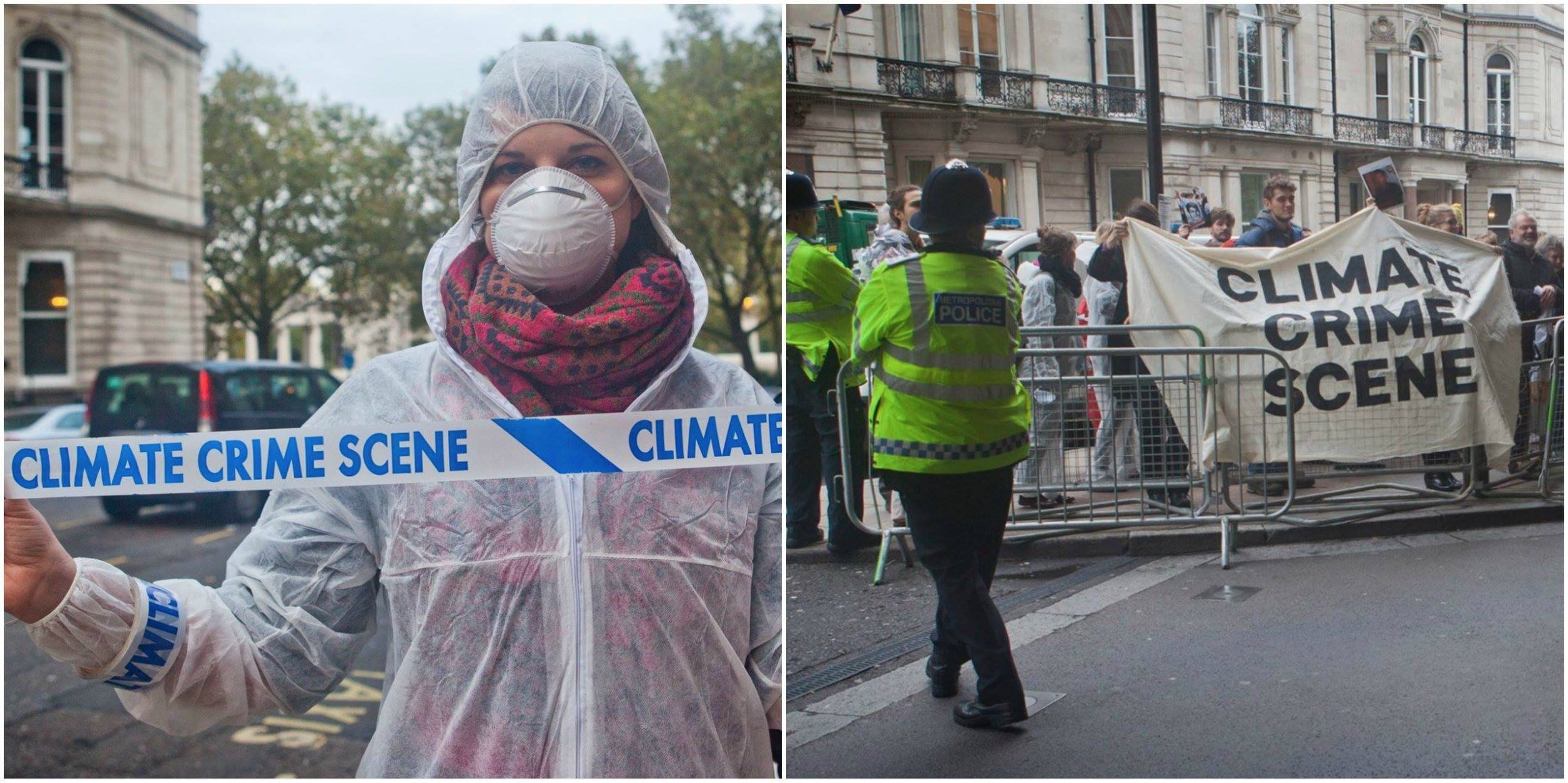 The New York
Times has for years also hosted a high-priced global summit for the
chieftains of Big Oil.
The New York
Times has for years also hosted a high-priced global summit for the
chieftains of Big Oil.
The Oil & Money summit,
which occurs each October in London, will meet for the fortieth time
this October 8th to 10th at the luxury Intercontinental London Park Lane
hotel. Top
speakers this
year include the CEOs of BP and Royal Dutch Shell, and the oil ministers
of Qatar and Iraq.
The theme,
“Strategies for the Energy Transition,” “reflects the crossroads at
which the energy industry now finds itself:”
Advances in technology, ranging from electric vehicles and battery
charging to solar and wind power promise extensive disruption to
existing patterns of energy usage and threaten the dominance of oil
and gas in areas like transportation and power generation. But at the
same time, technology breakthroughs in other fields have made the
exploration and development of petroleum resources cheaper, safer and
more efficient.
The overview politely avoids mention of fossil-fueled global warming,
referring only to how the oil and gas industry is “harnessing new
technologies” to “reduce its carbon footprint.”
The first
day’s focus is
the natural gas industry—two of the sessions do explicitly mention
climate change, in the context of environmentally conscious investors
and the promotion of natural gas “as a bridge fuel to a lower carbon
economy.”
The second day’s focus is on the geopolitics of the global oil market;
the third day discusses what’s needed to keep the U.S. fracking boom
going (“technology holds the key to sustaining US tight oil growth once
all the best sweet spots have been produced”) and the threat of electric
vehicles to the oil industry.
At no point does it appear that the threat of civilizational collapse
due to the continued combustion of fossil fuels, nor the industry’s
decades-long campaign to thwart government regulation of climate
pollution, will be discussed.
Tickets to the
summit are $4,195; for another $795 attendees get the
benefit of
“Toasting the Energy Intelligence Petroleum Executive of the Year with
colleagues and clients at the prestigious annual gala dinner.” This
year’s honoree is Ben van Beurden, CEO of
Royal Dutch Shell.
With about 500 attendees, this one conference raises over two million
dollars for the Times and its co-host, the industry publisher Energy
Intelligence.
A handful of young oil and gas professionals get to attend the
conference with the ironically named “Energy Leaders for
Tomorrow”
sponsorship.
The New York Times Company’s president of its international business,
Stephen
Dunbar-Johnson,
will be opening the summit. On Twitter, he has frequently professed
great
concern about
the Trump administration’s attacks on climate policy. He has not
indicated how he will address the world’s lords of oil.
Climate activists have
protested
the “climate
criminals”
at the conference the past several years.
In a
statement
to DeSmog UK in 2018, a New York Times Company spokeswoman said the
conference would “address the transition to a low carbon economy, an
issue which has been covered extensively by The New York Times. That
transition is unlikely to occur without the participation of the world’s
largest energy companies.”
A newer addition to the New York Times
Conferences line-up is the New Rules
Summit, where the New York Times calls
on leaders “to create a boldly inclusive vision of the workplace— and
transform it into reality.” Its speakers reflect that mission- 29 of 34
are women, the majority non-white. The New York Times does not appear to
be calling on Oil & Money attendees to do the same—only two of the 53
speakers are women. There do not appear to be any black speakers.
The Times’ editorial board purports that “most sentient people agree
the world must rapidly wean itself
from”
fossil fuels “or risk ecological and social
disaster.”
By that measure, the Times’ involvement in helping ExxonMobil develop
climate-denial and greenwashing advertorials on its
pages
and
website,
as well as its organization of the Oil & Money Conference, puts into
question the sentience of its leadership.
 The New York Times has dropped its
The New York Times has dropped its  and
and  The protesters
The protesters  Two of the protesters superglued their hands to the
doors of a side entrance, and others tried to infiltrate the gala.
Two of the protesters superglued their hands to the
doors of a side entrance, and others tried to infiltrate the gala.
 About
About  The New York
Times has for years also hosted a high-priced global summit for the
chieftains of Big Oil.
The New York
Times has for years also hosted a high-priced global summit for the
chieftains of Big Oil.